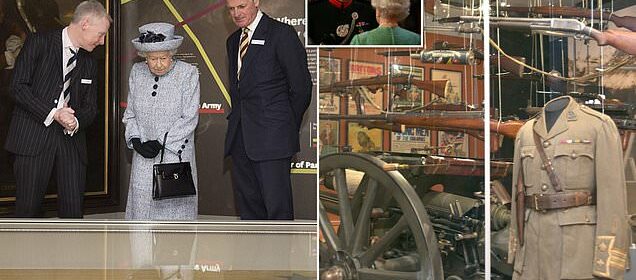National Army Museum director says it will not be decolonised

National Army Museum will not be decolonised, vows head saying ‘we should not be ashamed of our history’ – as other institutions start sending their exhibits back to where they came from
- Justin Maciejewski said there will be no decolonisation at flagship army museum
- Comments come amid increasing scrutiny surrounding museum’s colonial links
The National Army museum will not be decolonised, its director has vowed, saying Britain should not be ‘ashamed of any of our history’.
Anonymous staff members at the museum previously described its approach to colonialism as ‘outdated’, the Museum Association reported in 2021.
Justin Maciejewski, who himself served in the army for 27 years, defended the latest exhibition at the museum, which receives the majority of its funding from the Ministry of Defence.
The Conflict in Europe exhibition includes posters aimed at recruiting citizens from the Empire in various conflicts under the British Crown.
The museum boss told the Telegraph in no uncertain terms ‘there’s no decolonising to happen here’ and argued that history should not be viewed through ‘today’s lens’.
Justin Maciejewski, who served in the army for 27 years, defended the latest exhibition at the Ministry of Defence-funded museum. He is pictured receiving a Distinguished Service Order from the Queen in 2008
An exhibition at the Army’s museum in Chelsea. It’s director has said it will not be decolonised
‘Soldiers from the Empire, from the Commonwealth, as we call it today, volunteered in Britain’s hour of need to serve the Crown and Britain and they did it with a sense of pride,’ he said.
‘They were part of this Empire at the time, and they saw it very differently from the way we may see it today.’
His comments come as museums up and down the country review the provenance of their artefacts amid increasing scrutiny surrounding their colonial links.
Last summer, Glasgow became the first city in the UK to return stolen objects turned into museum artefacts back to India.
Seven objects were taken to New Delhi as part of a historic agreement, including a ceremonial Indo-Persian tulwar (a type of sword), believed to be from the 14th century, and an 11th century carved stone door jamb from a Hindu temple in Kanpur.
In November, George Osbourne, the chairman of the British Museum, opened the door to some of its most well-known artefacts being returned to their countries of origin.
But the museum has since resisted calls to return the Elgin Marbles to Greece, despite the Vatican doing so last month.
London has long argued that the sculptures had been taken with permission from the Ottoman Turks who ruled Greece at the time, but Athens insists they were stolen.
The museum, which is based in Chelsea, was opened by Queen Elizabeth II in 1960 and reopened following a three-year refurbishment in 2017 (pictured)
In 2021, the British Museum received a written request from Nigeria’s Federal Ministry of Information and Culture requesting the return of ‘Nigerian antiquities,’ but the museum has declined to do so.
READ MORE: Glasgow becomes first city in UK to send museum exhibits back to India
The Universities of Oxford and Cambridge both promised to return the Benin bronzes in their collections.
The British Museum has engaged in projects around decolonisation, along with the Imperial War Museum and Bodmin Keep, Cornwall’s Army Museum.
Parliament also recently commissioned a report which aimed to shed light on the links between portraits in the Palace of Westminster and the transatlantic slave trade.
It labelled portrait subject General Sir John Moore, who died fighting the French in the Battle of Corunna in 1809, as a ‘person who supported slavery, had financial or family interests in the transatlantic slave trade and slavery’.
In his interview, Maciejewski defended him as a celebrated soldier and said the museum was ‘proud’ of every soldier who fought for this country.
He added that his own stance, like the museum’s, is that ‘we’ve got to see it within the context of the times, and we’ve got to let the time speak for itself rather than overexplain.’
The Museums Association, which campaigns for ‘socially engaged museums’, published an article in 2021 quoting unnamed Army museum staff who claimed there was a ‘sanitisation and Disneyfication’ of exhibitions.
The museum, which is based in Chelsea, was opened by Queen Elizabeth II in 1960 and reopened following a three-year refurbishment in 2017.
Source: Read Full Article



